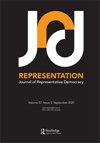公民友谊和党派关系
Q2 Social Sciences
引用次数: 0
摘要
政治和友谊以复杂且经常相互冲突的方式相互联系。一些理论家在阅读了亚里士多德之后,认为公民之间的公民友谊是正义的必要条件,甚至是在正义之前。相比之下,那些建立在共同党派基础上的政治友谊往往被视为偏袒和派系斗争的迹象,被视为党内和党外人士之间缺乏友好关系的证据。在本文中,我解释并论证了这两种形式的政治友谊之间富有成效的兼容性:试图消除政治上的党派偏见不仅不是公民友谊的先决条件,而且会破坏公民友谊不同含义的表达机制之一。在最好的情况下,党派之争提供了一个结社空间,在这个空间里,公民友谊的不同含义可以被赋予具体的、纲领性的形式。然后,这些纲领在更广泛的民主舞台上与其他纲领竞争,这些纲领被理解为表达公民友谊的各种表达。因此,正确理解和实践党派之争,就可以为公民友谊的不同含义的竞争提供手段,并赋予其确定的形式。本文章由计算机程序翻译,如有差异,请以英文原文为准。
Civic Friendship and Partisanship
ABSTRACT Politics and friendship connect to one another in complex and often conflicting ways. Some theorists, following a particular reading of Aristotle, regard civic friendship between citizens as necessary for, even prior to, justice. By contrast, those political friendships that are grounded in shared party affiliations are often taken as signs of partiality and factionalism, as evidence of a lack of amity between those in and those out of the party. In this paper, I explain and argue for productive compatibility between these two forms of political friendship: Trying to rid politics of partisanship is not only not a prerequisite for civic friendship, but serves to undermine one of the mechanisms through which different meanings of civic friendship are articulated. At its best, partisanship provides an associational space within which different meanings of civic friendship can be given concrete, programmatic form. These programmes then compete with other programmes – understood as expressing, amongst other things, different articulations of civic friendship – in wider democratic arenas. Partisanship then, correctly understood and practiced, offers means whereby contests over different meanings of civic friendship can be navigated and given a determinate form.
求助全文
通过发布文献求助,成功后即可免费获取论文全文。
去求助
来源期刊

Representation
Social Sciences-Sociology and Political Science
CiteScore
3.50
自引率
0.00%
发文量
31
期刊介绍:
This change in scope follows two paths. Firstly, it seeks contributors who are interested in exploring the interface between democratic practice and theory. In particular, this focus seeks contributions that apply theoretical insights to actual examples of current practice. Secondly, while not neglecting the current focus of the journal, we would like to expand its international coverage so that the journal will offer our readers insights in the state of democracy worldwide.
 求助内容:
求助内容: 应助结果提醒方式:
应助结果提醒方式:


